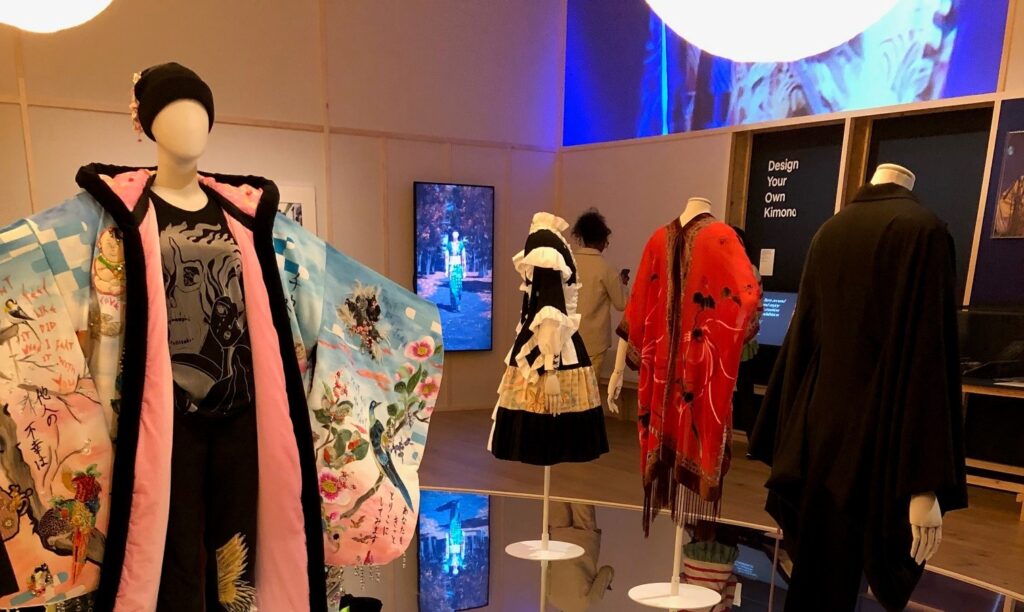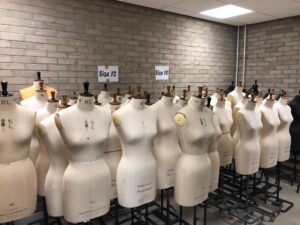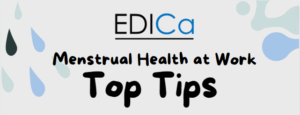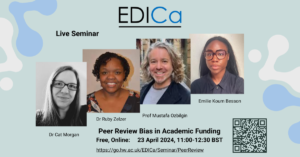My internship experience
This blog is written by Beth Wedgwood, who was hired as our first intern. EDICa host department, the School of Social Sciences at Heriot-Watt University, are funding three internships for people who would not normally consider a career in research. Our final internship will be advertised next year. The position is for one month full-time equivalent, or spread over a longer period as part-time.
Published : 23/10/2024
Home » Widening access internship – reflections from an EDICa intern
After graduating in the summer of 2022, I had no plans to continue within academia and I pursued other graduate opportunities. A year later, in 2023, I was seeking a change and came across the EDI Caucus Internship. It offered the opportunity for someone, who wouldn’t normally consider research as a career, to give it a try. Having a sociology degree and an interest in equality, diversity, and inclusion (EDI) – I applied.
Fortunately, I was successful, and I started the internship in October 2023. I received a warm welcome from the entire EDICa team who were quick to involve me in various meetings, introducing me to team members and the range of research projects within the Caucus.
Experience
During my internship I worked closely with Dr James Richards, who was in the early stages of a UKRI funded project looking at the experiences of doctoral students. I was able to take on various responsibilities to help support the recruitment and planning efforts. During this time, I honed my networking and research skills, whilst also picking up new skills in survey design and certain Microsoft 365 programs. As part of the recruitment drive, I used social media and email to reach out to academic groups and networks, resulting in over 1000 students showing interest within just two weeks. The involvement in this study helped immerse me into the team and I quickly found myself confident working alongside both my colleagues and our funders.
I was also able to take an active role in EDICa’s research promotion during my internship. After querying about EDICa’s social media and presenting my ideas with some members of the team, I was given the opportunity to launch EDICa’s Instagram presence. I initially started by creating content that promoted EDICa initiatives and values, designing graphics that discussed EDI in the workplace and incorporating EDICa research where possible. This later expanded to recruitment content, developing digital media to promote our research projects. This aspect of my internship allowed me to conduct and present research in a unique manner, whilst promoting the project’s research initiatives.
It was particularly special when content was recognised and shared by organisations promoting EDI, such as ‘The ADHD foundation’, ‘Deaf Umbrella’, ‘Neurodiverse Brains in the Workplace’ and a comment on a Movember post from ‘Prostate Cancer UK’.
Inclusivity
In addition to gaining valuable professional experience, my time at EDICa provided me with insight into a more inclusive and flexible work environment than any I had previously encountered. As someone with ADHD, I’m aware of how neurodivergence can influence my workplace experience.
From the outset, EDICa demonstrated a commitment to inclusivity and understanding. They accommodated my needs, from providing interview questions in advance to encouraging open discussions about neurodivergence. When tackling tasks that were new to me or that I had not encountered since university, the team consistently offered guidance and reassurance, boosting my confidence and abilities. Working in a flexible, inclusive and supportive environment has made me feel valued and understood.
I have also been able to increase my knowledge of EDI practices and I am continually learning ways to integrate inclusivity into my work, from incorporating ALT text to selecting dyslexia-friendly colours and fonts.
Further Opportunity
When my internship came to an end in November 2023, I was fortunate to be given an extension with EDICa as a research assistant. This allowed me to see the doctoral student project through to the end, taking on greater responsibilities within the data collection, including planning and hosting focus groups with students and stakeholders. I was later involved with aspects of communications, data analysis and the final report write up.
The opportunities have continued, and I am currently working on another UKRI funded study, where I have been able to utilise my gained experience of research, digital tools and report writing to gather and analyse evidence to develop a final report of recommendations for this project.
Challenges
The short duration of the internship, lasting only a month, could pose difficulties for some individuals. Although it’s possible to spread the workload over a longer period on a part-time basis, this may not be feasible for everyone. Personally, I was in a transitional phase of seeking new employment when I took up the internship, which allowed me to commit to the month-long opportunity, as well as accept extension opportunities. However, I acknowledge that not everyone may have the flexibility or resources to navigate short-term work arrangements.
What has the EDICa internship meant to me?
Accepting a month-long internship has provided me with experience and opportunities I would have never anticipated when applying in the summer of 2023. I have developed and gained valuable skills and experience that I am certain will continue to benefit me, in the future and whatever the next stages of my career are.
By providing an opportunity to explore the world of research to those like me, who had not considered it as a career, this internship has allowed me to see that there are a variety of roles and opportunities available to all kinds of people within academic and research settings.
This internship has given me the skills, confidence, experience, and support to thrive in an environment I once considered out of my depth.
Beth can now be found working full-time on an EPSRC-funded Impact Acceleration Award project called “Disability Inclusive Careers in Engineering & science” – or DICE. This is led by Prof Kate Sang, along with Prof James Richards, Dr Graeme Barker, and Fenella Watson as Project Manager https://disc.hw.ac.uk/DICE/

Improving the workplace support for neurodivergent women managing their menstrual health: Neurodiversity and menstrual health at work
Check out our report, co-authored by Beth Wedgwood.
Featured resources

Neurodiversity & Menopause at Work Seminar Recording
Published 15 Oct 2024
Watch/listen to a panel discussing neurodivergence & menopause.

Menstrual Health Top Tips
Published 8 March 2024
Download our poster on Menstrual Health at Work – Top Tips.

Peer Review Bias Seminar Recording
Published 23 April 2024
Watch/listen to a panel discussing peer review bias in the funding process.

